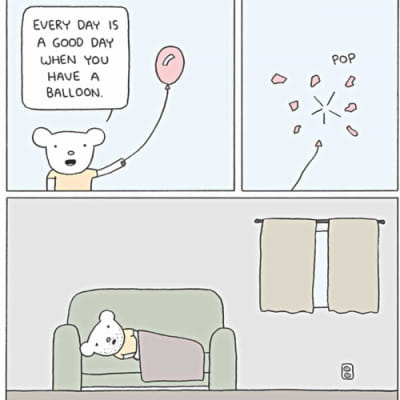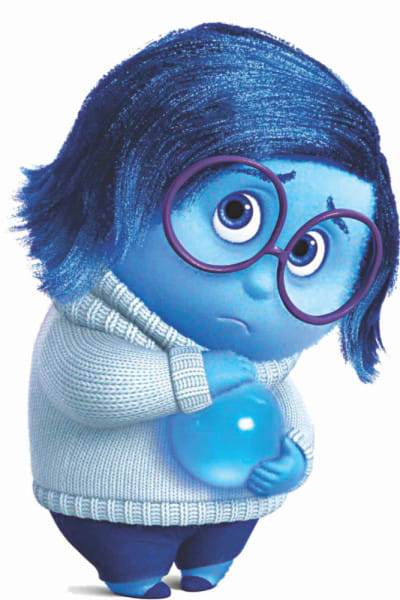DELETING FEELSBADMAN.JPG

'Depression' is an awkward word.
It is used to describe a state of sadness that appears long-term and unshakeable. The difficulty is that while a great many of us have experienced – or do still experience – this unpleasantness, it is also a mental disorder that you can be diagnosed with. It feels disrespectful to those who are confirmed sufferers from clinical depression to use the word in any other context; at the same time those of us who have not been diagnosed (for whatever reason: maybe we never chose to seek help) should not have our moods entirely dismissed.
So what word do we, the undiagnosed, take refuge in? 'Sadness' doesn't cover the scale of it, even in its milder forms. 'Melancholy' is closer to the mark but has associations with sweet artistry that don't quite match up to some of the more sinking thoughts that arrive at 3AM. We will have to settle for 'depression', with all due respect and consideration to those who struggle from what that word means in a medical context. It really is the only way to quickly get across the state of mind.
I am not an expert in mental health – or in anything else, for that matter. You absolutely should not look to me for definitive guidance on this subject, and if you write to me, I won't necessarily be able to say anything useful that won't be in the rest of this article. I have, however, about a decade's worth of experience with the state of mind and can talk about how I've been trying to get better. I hope it helps, but it's not meant to be authoritative.

So, the first and most important step is to admit that you are not in a good place, and that this is fine. Yes, you'd rather not be sad most of time, but you are and that isn't immoral. Having acknowledged this, what do you do about other people? In my experience, it's not necessarily useful to make it public knowledge. There is a catharsis in honesty, but it really falls under the umbrella of personal stuff that most of the people in your life can't really be bothered with. That isn't unfair; we all wear masks. If you feel that you have to let it out and make it known, do it if it feels right – but it's unlikely to be of any further help and may not be worth the awkwardness created.
However, the people you are really close to ought to know what you're going through. Ideally, you'd be able to tell all of them, but you probably can't in actuality. There are many otherwise fine, wonderful people who couldn't navigate someone else's depression if their life depended on it. For them, it might be better to pretend. And about those whom you do end up telling, be very careful. Your loved ones have a duty to prop you up and care for you, but that's not all they are there to do. It's very easy to slip into the mind-set that your problems come first and that if they aren't there for you at this very moment you need, then really they hate you, etc. Paranoia comes with the territory, but honestly speaking they're just busy living their own lives a bit. That's fine. You want them to do that. (And if you don't, that's a problem you need to address immediately.)
Do share your problems with those whom you trust to be able to help (in whatever way works for you.) Don't expect to be able to share them 24/7. And don't expect them to solve your depression either. Ultimately, they aren't the ones inside your head. They don't have that final insight into what's going on, and they don't live under the weight of it. This makes them ultimately unable to effect a cure, and not obligated to experience your depression so extensively they might as well be having it themselves. It's OK to be needy but wrong to be toxic, and that will ultimately create real distance between yourself and your loved ones – not just the distance your paranoia invents. Don't let it go that far. Moderate yourself. It's not easy, but it is crucial.
Ultimately, the only person who understands your depression and has to live with it is yourself. This is not a defeatist fact, it is empowerment. You have something in your mind that's fighting against you, but the only weapons you ultimately need are in there as well. Make changes. If you genuinely believe that there are aspects of your personality that create bad experiences for yourself that then contribute to your depression – nudge yourself towards a better direction. Summon the energy to do that thing you know you want to do (and you know you can do it too, it's not that hard). Fresh air and nature help, as does the discipline of exercise.
Curate your entertainment. Find pieces of art that seem to grasp the problems you are going through; they can help you frame things better, and occasionally provide courses of action. At a particularly low moment, I saw a film where a character dealt with a problem I was facing, and he showed me that some hurts can be worked around but not overcome and that there is dignity to be found in this. These stories stick with you and can go a long way towards helping. It's alright to indulge in a pure expression of hurt, but in my experience stuff that continually makes you sad shouldn't be the majority of your diet. Steven Wilson will ultimately become your enabler. Try some classic blues instead. Mix it up; the rush of life can come from entirely unexpected quarters.
Most importantly, you have to be ready to be in it for the long haul. Don't expect an overnight solution. There will be times when it feels that the weight will never lessen. There is no dark inevitability to it, though. I won't promise that things must get better, but they can. And a lot of that ability to effect change lies inside you. Dig down and access it. Take your time, but see it done.

 For all latest news, follow The Daily Star's Google News channel.
For all latest news, follow The Daily Star's Google News channel. 



Comments